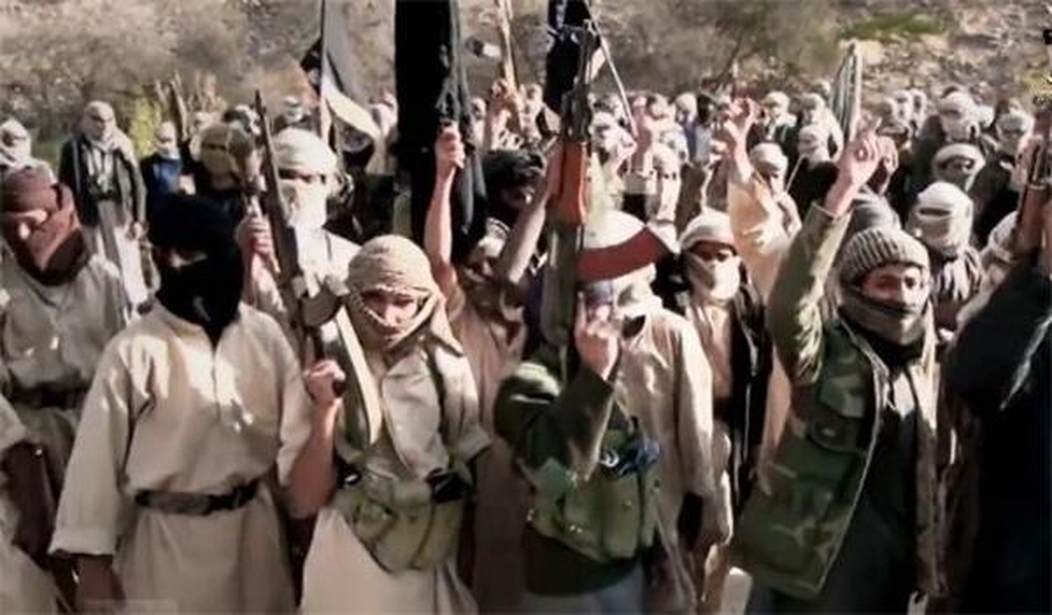WASHINGTON — The U.S. and Yemen launched drone strikes against al-Qaeda in the Arabian Peninsula targets in the wake of a bold video released by the terror group showing a confab of terrorists, including al-Qaeda No. 2 Nasir al-Wuhayshi, essentially mocking the west with a meeting in the wide open.
The counter raid that began after the video hit the headlines, though, couldn’t exactly catch the big-name jihadists on their way home — the meeting in the footage occurred sometime in mid-February through the end of March, according to analysts.
The strikes, then, were as much about saving face as trying to catch up to the intelligence revealed in the video, which featured a former Guantanamo detainee and was followed by another threatening release from al-Qaeda affiliate Al-Shabaab in Somalia.
Yemen’s Saba news agency reported Monday that an airstrike “killed a number of militants” of varying nationalities at al-Qaeda training camps in a remote mountainous region between Abyan and Shabwa province. Yemen’s Supreme Security Committee said strikes were launched on Saturday and Sunday based on “certain intelligence information that terrorist elements were training in those camps and planning to target vital civilian and military facilities.”
The Yemeni government said the Saturday strike targeted a truck carrying 11 al-Qaeda terrorists to al-Bayda city, where they planned to target “vital military and civil sites.” Ten of those on board were reportedly killed. Unfortunately, a pickup drove too close to the targeted vehicle, and three civilians within were killed in the strike.
Yemeni officials initially speculated that bomb-maker Ibrahim Asiri may have been killed in the strikes, but withdrew those claims as the day wore on.
“We’re aware of the reports and I’d point you to the Yemeni government and what the government itself has said. In statements to the press, the Yemeni government has confirmed that airstrikes were carried out this weekend against al-Qaeda militants in remote training camps and in a convoy. According to the Yemenis, these individuals were planning to target civilian and military facilities in al-Bayda and elsewhere,” White House press secretary Jay Carney said at today’s briefing.
“Now, I can’t speak to specific operations, but we have a strong, collaborative relationship, as you know, with the Yemeni government and work together on various initiatives to counter the shared threat we face from AQAP,” he added. “So in terms of more details about the strikes that the Yemeni government has discussed, I would refer you to the Yemeni government.”
That likely would have been a victory lap if a big-name target had been confirmed killed. Carney was then asked if AQAP’s growth and threat meant President Obama felt differently about his promise to scale back drone strikes.
“We have a strong collaborative relationship with the Yemeni government and work together on various initiatives to counter the shared threat we face from AQAP. We support the Yemeni government’s efforts to tackle terrorism within their own borders; and beyond that, for details of these reported incidents, I would refer you to the Yemeni government,” Carney replied.
“Again, without speaking about specific operations, I can tell you that in May 2013, President Obama spoke at length about the policy and legal rationale for how the United States takes direct action against al-Qaeda and its associated forces outside of areas of active hostilities, including with drone strikes. And as the president made clear, we take extraordinary care to make sure that our counterterrorism actions are in accordance with all applicable domestic and international laws, and that they are consistent with U.S. values and policy.”
Over at the State Department, press secretary Jen Psaki was asked if it was a coincidence that the AQAP video became the top story on the news and airstrikes then followed.
“I would put a call in to the Yemeni government and see if they have more details to share with you,” she replied, hastily wrapping up the briefing.
“You are aware that the Yemeni government was not able to provide a single name or a single statistic on these people that were killed, and allegedly were Qaeda?” a reporter asked.
“They confirm the details,” Psaki said before leaving.
House Homeland Security Committee Chairman Mike McCaul (R-Texas) noted the strikes ultimately were about something else as well: a tacit admission that al-Qaeda is not on the run, but alive and healthy.
“As you saw in the video, one of the most brazen outcomings of al-Qaeda really since bin Laden, we had 100 people in this video come out to announce that they want to attack the West,” McCaul told Fox.
“When you look at al-Qaeda in the Arabian Peninsula, they are perhaps the largest threat to our homeland security. They are the ones who build the bombs to put on airplanes undetected. Al-Asiri is a famous bombmaker, the most premiere worldwide. And so, I do think they pose the biggest threat not only to places like Western Europe but also the United States. And I think these drone strikes are very significant in taking out that threat,” he continued, stressing that the question is whether “these are recruits that they hit to sort of downplay their recruiting capability” or actual high-level targets.
The chairman says he doesn’t know if the strikes were a direct response to the video, but it’s “very likely.”
“Obviously, the drone strikes have been ramped up since the video came out. And I would say with respect to the administration’s narrative that al-Qaeda’s on its heels and the War on Terror’s over. I think this demonstrates that that’s not the fact. That’s not reality and I think we need to deal with threats against the United States in a realistic way,” McCaul continued.
“And so, I do applaud these strikes on these militants who could very well go to the United States and carry out terrorist attacks like what we saw in Boston. Remember, this is the same group that brought us the Inspire magazine that we believe inspired the Boston bombers to build their bombs.”
The video surfaced before the one-year anniversary of the Boston bombings in a March 29 posting on an AQAP Twitter account.
According to SITE Intelligence Group, it was basically a welcome-home party for AQAP fighters who escaped from the Central Prison in Sana’a in February.
Among the speakers was former Guantanamo detainee Ibrahim al-Rubeish, who was transferred to Saudi custody in 2006 and escaped. He’s since continued climbing up the ranks of al-Qaeda.
In the video, Wuhayshi declares, “O brothers, the Crusader enemy is still shuffling his papers, so we must remember that we are always fighting the biggest enemy, the leaders of disbelief, and we have to overthrow those leaders, we have to remove the Cross, and the carrier of the Cross is America.”









Join the conversation as a VIP Member